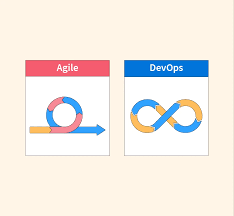
The Role of Full Stack Developers in Agile and DevOps Environments
In the ever-evolving software development landscape, two methodologies have gained significant traction over the years: Agile and DevOps. Both approaches emphasize collaboration, efficiency, and continuous improvement, and they’ve changed the way software is developed and delivered. Within these environments, Full Stack Developers play a pivotal role, serving as the bridge between frontend and backend development, and contributing to the success of Agile and DevOps initiatives.
Understanding Agile and DevOps
Before delving into the role of Full Stack Developers, let’s briefly review what Agile and DevOps entail:
1. Agile Methodology: Agile is a project management and product development approach that prioritizes flexibility, customer collaboration, and incremental progress. It encourages cross-functional teams to work together in short iterations, focusing on delivering small, valuable increments of a product. Agile development methodologies include Scrum, Kanban, and Lean, among others.
2. DevOps Culture: DevOps is a cultural and technical movement that emphasizes collaboration and communication between development (Dev) and operations (Ops) teams. It aims to automate and streamline the software delivery process, from development to deployment and monitoring. DevOps practices include continuous integration, continuous delivery (CI/CD), and infrastructure as code (IaC).
The Role of Full Stack Developers in Agile:
-
Cross-Functional Collaboration: Full Stack Developers are well-equipped to collaborate with cross-functional Agile teams. They can contribute to both frontend and backend development tasks, facilitating a more integrated and holistic approach to software development.
-
Flexibility: Agile methodologies value adaptability and responsiveness to changing requirements. Full Stack Developers are versatile and can pivot between tasks, helping teams respond effectively to evolving project needs.
-
Reduced Bottlenecks: Full -Stack Developers can help reduce bottlenecks in the development process by having a broader skill set. They can assist with tasks across the development stack, ensuring that work keeps flowing smoothly.
-
User-Centric Focus: Agile prioritizes customer feedback and delivers value to end-users. Full-stack developers, with their ability to work on front and backend components, can ensure that the user experience is consistently improved throughout development cycles.
The Role of Full Stack Developers in DevOps:
-
Automation: DevOps relies heavily on automation to streamline workflows. Full Stack Developers can play a key role in automating front-end and back-end development tasks, contributing to a more efficient pipeline.
-
Continuous Integration and Continuous Delivery (CI/CD): Full-stack developers are instrumental in implementing CI/CD pipelines. They can automate the building, testing, and deployment of code, ensuring that changes are delivered quickly and reliably.
-
Infrastructure as Code (IaC): In a DevOps environment, infrastructure is treated as code. Full Stack Developers can use their knowledge to define infrastructure requirements and manage infrastructure through code, improving scalability and reliability.
-
Monitoring and Feedback Loops: Full-Stack Developers can contribute to the establishment of monitoring and feedback mechanisms, which are essential for DevOps. They can help set up tools for tracking application performance and user feedback, enabling continuous improvement.
Conclusion
In Agile and DevOps environments, Full Stack Developers are invaluable team members who possess the skills and adaptability required to drive collaboration, automation, and efficiency. Their ability to straddle both frontend and backend development makes them essential contributors to the success of projects that prioritize rapid development, continuous integration, and the delivery of value to end-users. As Agile and DevOps methodologies continue to shape the future of software development, Full Stack Developers will remain at the forefront of innovation and progress.
For professionals looking to enhance their skills and become proficient Full Stack Developers, enrolling in a comprehensive Full Stack Developer Training Course in Nagpur, Indore, Lucknow, Meerut, Noida, or other cities in India is a strategic investment. Such training programs provide a structured curriculum covering both frontend and backend technologies, agile methodologies, and DevOps practices. By acquiring the necessary knowledge and hands-on experience, participants can position themselves as sought-after Full-Stack Developers in the dynamic and competitive IT landscape.


